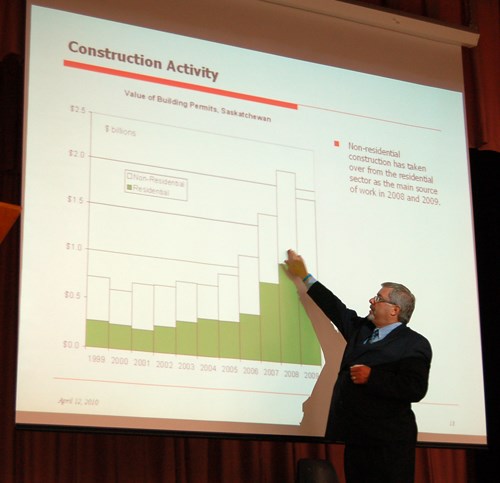The keynote speaker at the Saskatchewan Rising Symposium held at McKenna Hall on October 21 spoke about the sustainability of Saskatchewan's economic boom.
Paul Martin is a partner at Martin Charlton Communications, chair at Vistage International, and a business commentator at Rawlco Radio.
Martin began his speech by explaining the worldwide economic downturn in 2008. He said that it was due to a "banking crisis" in the United States that was caused by the sale of "toxic mortgages" which allowed citizens to obtain zero-down mortgages with a one to two percent interest rate. That rate then shot up to six percent by year three.
"People were encouraged to buy and build multiple houses and sell high," said Martin.
The result of this was people were buying homes out of their price range and eventually, unable to make their rising mortgage payments, the banks were forced to foreclose on these mortgages.
"Interestingly, we didn't play that game."
He said that Saskatchewan, in particular, was able to stay out of the financial crisis of 2008 by relying on the sale of their natural resources - oil and potash.
"We became a resource-based economy with a producing economy on the side," said Martin.
He spoke about the challenge that lies ahead for employers seeking employees.
"There are way more jobs here than people working."
He said that employers are looking forward by hiring immigrants, seniors and relying on inter-provincial migration.
"The fastest growing age of job creation is age 65," said Martin. "If you want to meet them, go to Tim Horton's."
Martin said that migration from other provinces took a turn around in 2006. While Saskatchewan had been losing people to other provinces for decades, particularly Alberta, it finally began gaining population through inter-provincial migration.
"After 25 negative years we now have five consecutive positive years."
Martin said now that the four western provinces are leading the country, Canada will see a shift from east to west, politically.
He said that Saskatchewan's capital investment has doubled since 2004 and now sits at approximately $12 billion.
"Why the shift? An increase of the middle class in India and China."
He explained what the growing world population has an increasing demand for.
"Food, fuel and fertilizer," said Martin. "Guess what Saskatchewan has?"
Martin ended his speech with an optimistic message, asking the crowd if the province's success is sustainable.
"Absolutely!" He answered his own question emphatically.
"There is no better place on the planet that's better positioned for future financial gain," said Martin of Saskatchewan.




